How to Grow Onions – A Step-by-Step Guide for a Bigger, Better Harvest
Onions are one of the most satisfying crops to grow at home – and they’re simpler than you think. This guide breaks down everything you need to know, from planting to harvest.

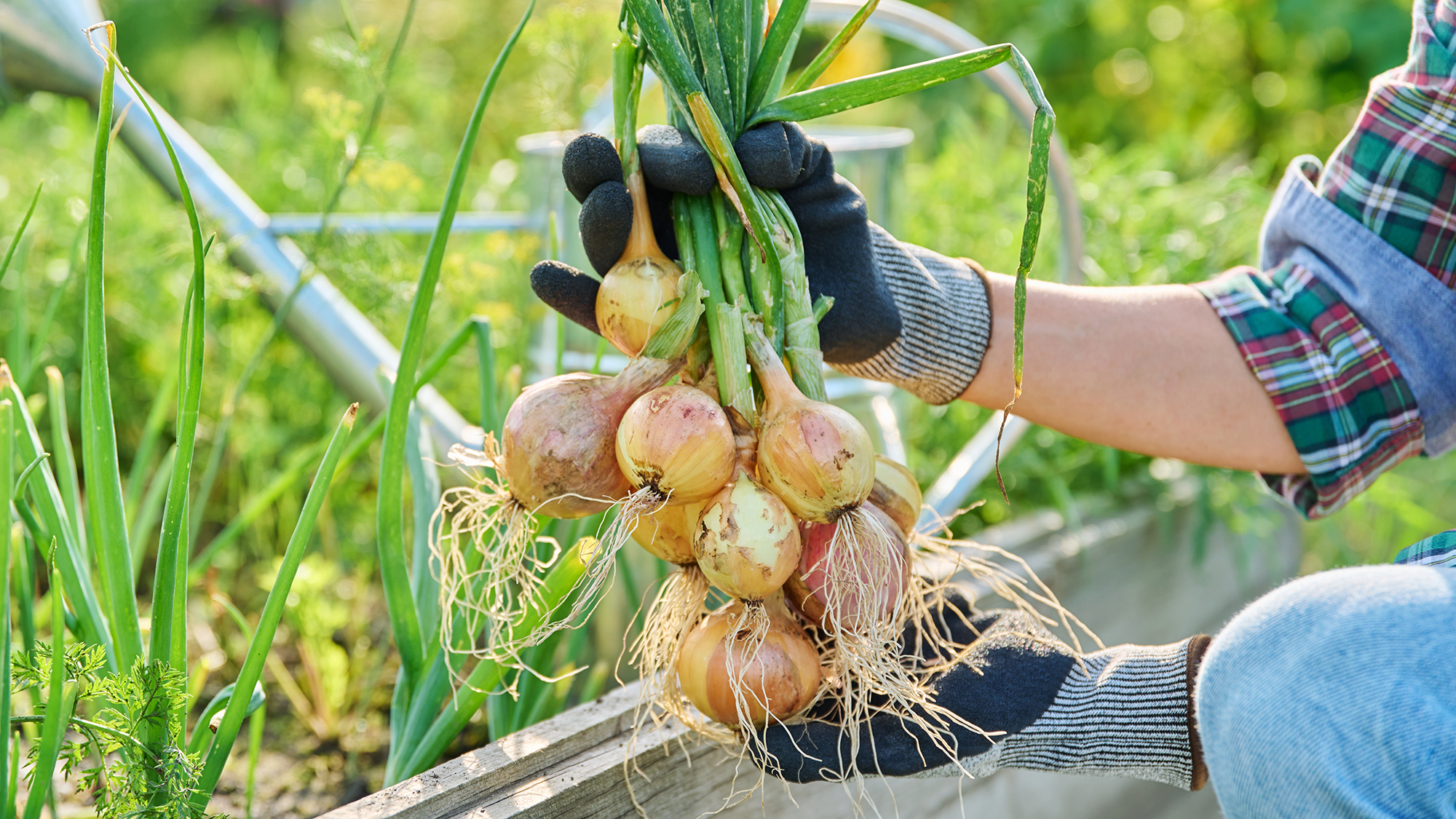
Sign up for the Gardening Know How newsletter today and receive a free copy of our e-book "How to Grow Delicious Tomatoes".
You are now subscribed
Your newsletter sign-up was successful
Onions are one of the world’s oldest cultivated plants, and it’s easy to see why their popularity has endured. Valued not only for their flavor but also for their ease of cultivation and long storage life, onions are grown widely for both commercial production and home gardens. Indeed, they make for an excellent home-garden crop because they are hardy, versatile, and provide a reliable yield with relatively modest care.
The common onion is thought to have originated in southwestern and central Asia, and today comes in a variety of forms, mainly cultivated for their enlarged bulbs. These include the globe-shaped white, yellow, and red onions, the large mild varieties such as Spanish or Bermuda onions, and smaller types like pearl onions. Some forms, including green onions (also called scallions), are grown mainly for their flavorful leaves.
Growing onions is generally straightforward. They grow well from seed, transplants, or small “sets,” and don’t require highly specialized care. Considering their low maintenance, easy harvest, and usefulness in the kitchen, onions of any sort are a must if you are starting a vegetable garden.
Quick Onion Facts
Botanical Name | Allium cepa |
Plant Type | Bulb |
Plant Height | 1–3 feet (30-90 cm) |
Plant Spread | 6–18 inches (15–45 cm) |
Light | 6–8 hours of direct sunlight per day |
Soil | Loose, well-draining soil with pH between 6.0–6.8 |
Hardiness | USDA Zones 3–9 (Not in the US? Convert your zone) |
Growing Season | Early spring to late fall for cooler zones, and over winter for warmer areas |
Time to Harvest | 90–120 days from seed; 56–70 days from sets or transplants |
What is an Onion?
Onions (Allium cepa) are part of the Allium family and are closely related to garlic and chives. They are fascinating plants that grow in layers, all wrapped in a dry, papery skin. Each layer corresponds to one of the onion's hollow, tubular leaves above ground. So, the more leaves you see emerging from the top of the plant, the more layers of crunchy onion there are underneath. If you see lots of leaves, you can bet you're growing some big onions.
Even though we usually grow onions as annuals, they are naturally biennial plants. In their first year, they focus on producing leaves and building up the bulb. If left in the ground over winter, the following spring the plant sends up a tall flowering stalk topped with a round cluster of small white flowers, which then produce seed.
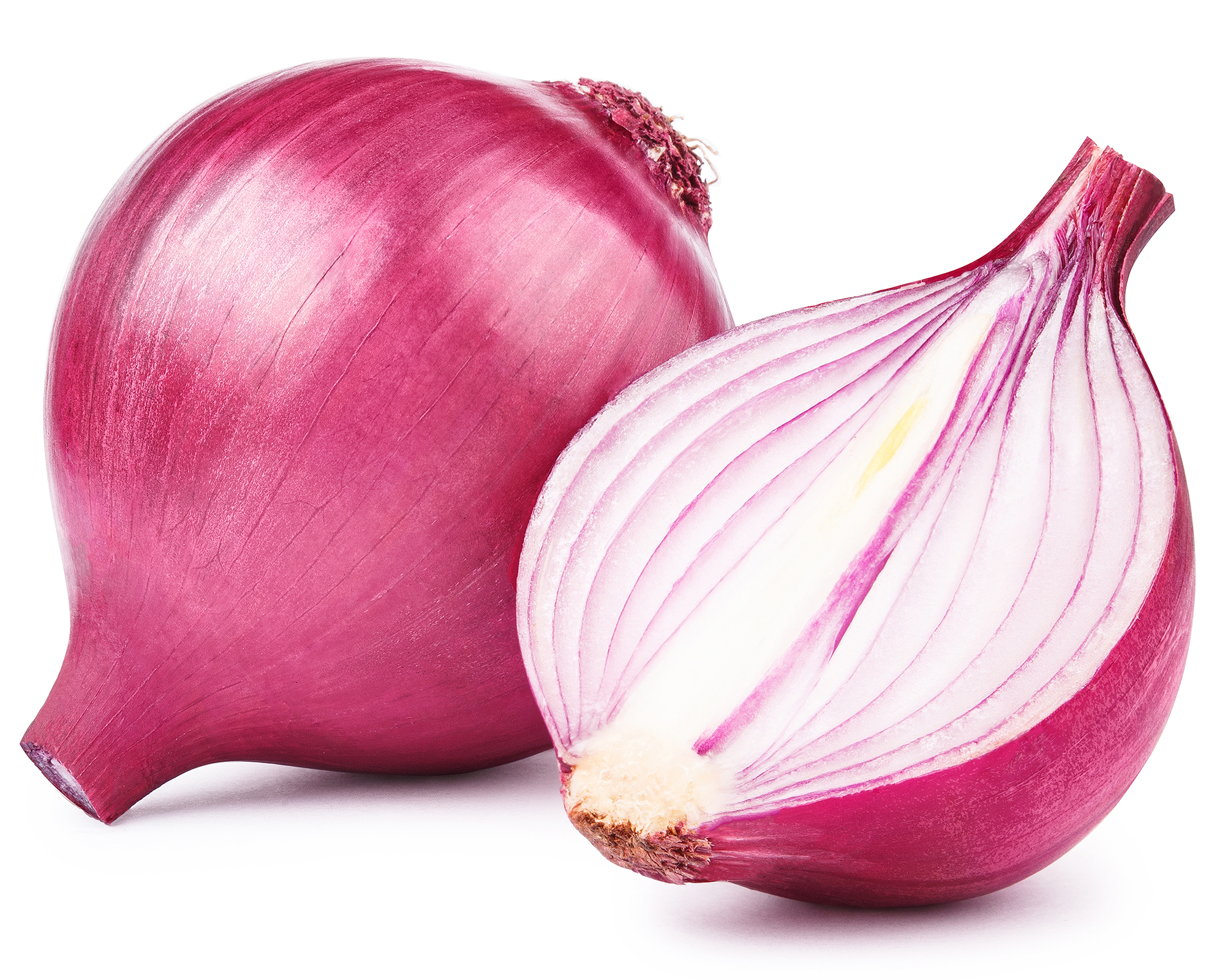
Types of Onions
As alluded to above, there are various types of onions that can be useful in the kitchen when harvested at just about any stage:
- Yellow onions: These are the most widely used cooking onions. With a strong, balanced flavor that mellows and sweetens when cooked, they store very well in a cool pantry.
- White onions: Milder and sharper than yellow onions, white onions have a clean, bright flavor.
- Red onions: With purple-red skins and crisp texture, red onions are mild enough to eat raw, so they are popular in salads, sandwiches, and pickles.
- Sweet onions: Also known as Vidalia, Walla Walla, and Texas Sweet onions, sweet onions have a lower sulfur content, which gives them a mild, sweet flavor. The one drawback is that they don’t store as long as yellow onions.
- Pearl onions: These tiny, white onions have a mild flavor and so are often used whole in roasts, stews and pickled recipes.
- Green onions, also known as scallions: Harvested before the bulb forms, scallions have tender white stems and mild green tops. They add an oniony brightness to dishes when used fresh or cooked.
- Similarly to green onions, bunching onions and spring onions are onions that are harvested prior to their bulbs enlarging. They are valued for their flavorful, slender stems rather than an enlarged bulb.
- Shallots are closely related to onions and have a mild, slightly sweet flavor that works especially well in sauces, dressings, and refined recipes; if you’re interested in growing shallots, they’re easy to cultivate and well suited to home gardens.
Burpee offers several dozen varieties of both bulb and green onions as seeds and sets. For either, you can harvest by digging up the whole plant or just clipping off a portion of the green stems. In the latter case, the plant remains growing and can produce multiple harvests.
Sign up for the Gardening Know How newsletter today and receive a free copy of our e-book "How to Grow Delicious Tomatoes".
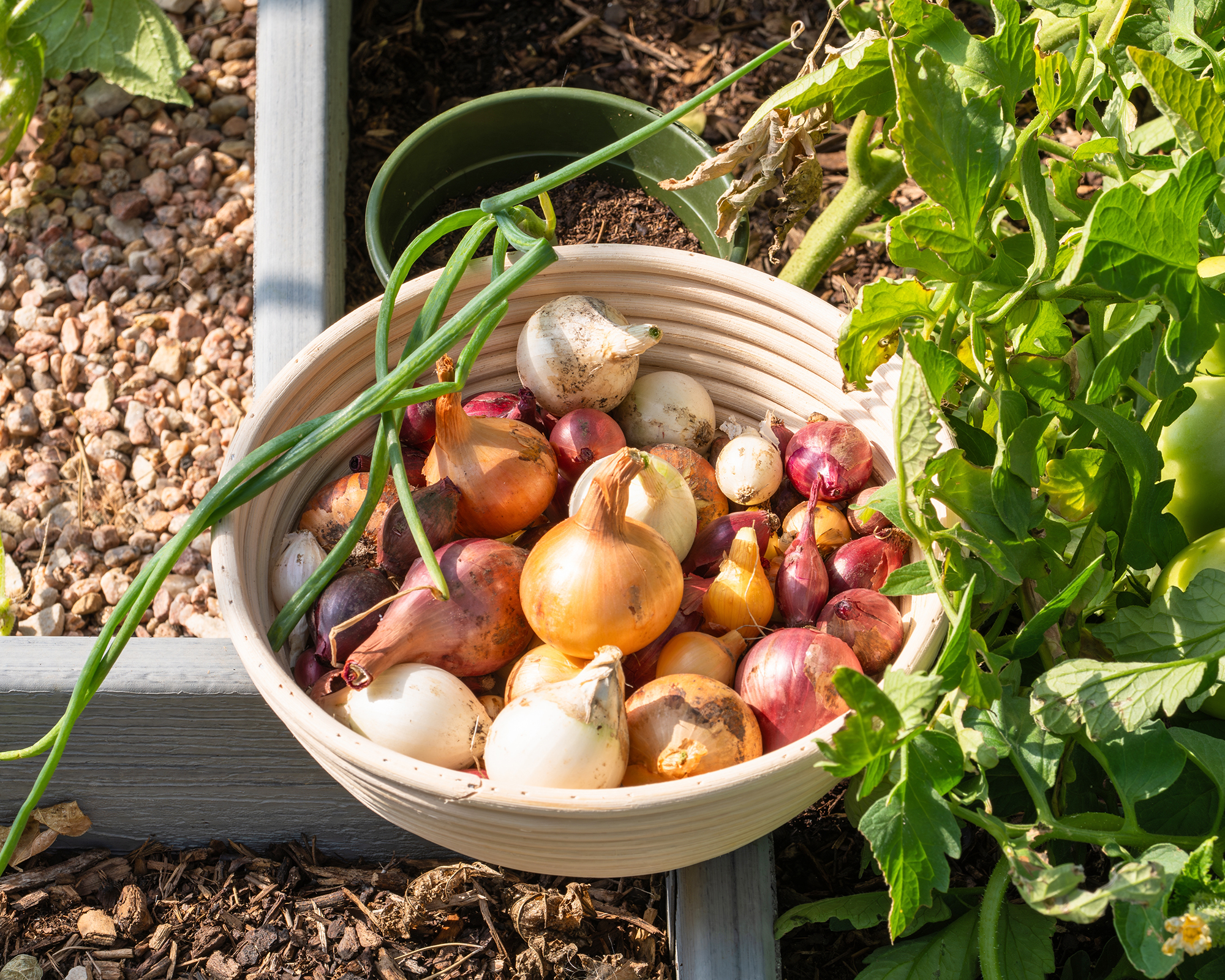
Short-Day or Long-Day Onions?
One key factor in growing a bountiful crop of onions is knowing the day length requirements of the particular variety you are growing. Onion bulb formation is dependent on day length, or more accurately, the number of hours of daylight the onions receive, and this is determined by genetics. Short-day onions will produce a bulb when days have about 10–12 hours of daylight. These onions would be suitable for southern gardens with mild winters. Examples of short-day varieties include Texas 1015 SuperSweet, Red Creole, and White Bermuda.
Long-day onions need 14–16 hours of daylight to begin forming a bulb. These are ideal for northern climates with long summer days. Examples include Walla Walla, Yellow Sweet Spanish, and Redwing.
A third class of onions—day-neutral or intermediate-day onions—form bulbs at around 12–14 hours of daylight and work well in many mid-latitude gardens. Planting the correct type for your region is essential. If choosing the wrong day-length variety, the plants may never form bulbs or may bolt prematurely. These intermediate-day onions include Candy, Super Star and Red Candy Apple.

Planting Onions
Whichever type you grow, onions are a relatively low-effort yet rewarding experience. The first step is to decide whether you want to grow them from sets, seeds, or transplants.
Sets, Seeds or Transplants?
An onion set is an immature onion bulb grown the previous season and dried for replanting. This gives gardeners a quick and reliable way to produce full-sized onions the next season. Sets are popular because they establish easily in cool soil, resist pests better than seed, and significantly shorten the time to harvest. When purchasing, look for firm, dry bulbs about the size of a marble. Choose uniform sets matched to your day-length region (short-day, long-day, or day-neutral).
Onions grown from seeds take longer than other methods. Especially if your area has a shorter growing season, you'll need to start by sowing seeds indoors and transplanting seedlings later to the garden.
Transplants are onion seedlings that you can either purchase from a garden center or online, or can grow yourself from seeds sown indoors.

When to Plant Onions
If growing onions from seeds, sow the seeds indoors 8 to 12 weeks before the last frost in your area.
Onion sets can be planted in the ground once the soil temperatures rise to around 50°F (10°C).
If going the onion transplant route, wait until the last frost date for your location has passed. Remember to harden off seedlings before moving them out into the garden, then transplant the onions to their beds.
Best Soil for Onions
The best soil type for growing onions is one that is sandy-loam or silty-loam and is rich in organic matter, well-drained, and has a soil pH between 6.0 and 6.8. This 4-in-1 soil moisture meter from Amazon also measures soil pH, temperature, and light levels.
If your soil is heavy with clay, amend it with a rich compost.
Onion Light Requirements
Onions at a minimum need at least 6-8 hours of sun on a daily basis for bulb development. However, as we noted above, the specific amount of daylight (day-length) for bulb formation depends on the variety. In very hot climates, a bit of afternoon shade could be beneficial.
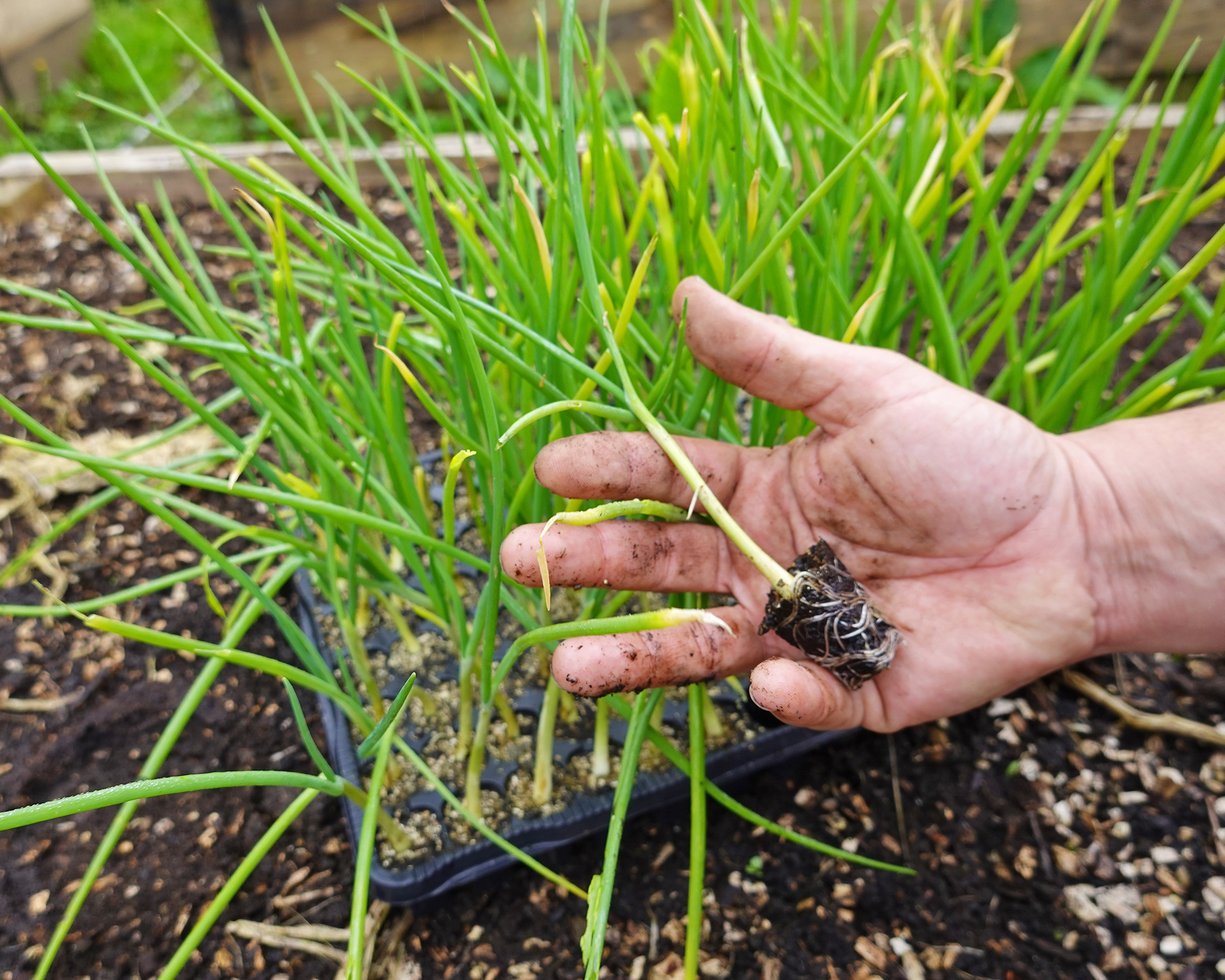
How to Plant Onion Sets
The method for planting varies depending on if starting from seeds, sets or transplants. The most common method is to plant onion sets directly into the garden:
- Prepare garden bed: Ensure you have loose, well-draining soil at a pH between 6.0–6.8. Add in compost to loosen soil if necessary.
- Planting spacing and depth: Break apart onion sets into individual bulbs and space about 4–6 inches (10–15 cm) apart in rows 12–18 inches (30–45 cm) apart. Push onion sets so the top is just a little below soil surface (about 1 inch / 2–3 cm). If using transplants or seedlings, separate into single plants and follow the same spacing.
- Water and mulch: Water in well to settle soil and eliminate air pockets; apply a light mulch to conserve moisture and suppress weeds.
Growing Onions from Seed
Onion seeds are typically started indoors 8 to 12 weeks before the last frost:
- Seed mix and trays: Use a lightweight seed-starting mix and shallow flats or cells. Sow thinly. This Burpee 36-Cell Self-Watering Greenhouse Kit from Home Depot creates just the right environment for germinating onion seeds.
- Sowing depth: Cover seeds lightly (1/8 inches / 3 mm) with the seed starting mix. Keep soil moist but not soggy.
- Light and temperature: Place the tray under grow lights or a bright window; keep the soil temperature between 65–75°F (18–24°C).
- Thin: When seedlings reach 2–3 inches (5–8 cm), thin seedlings so plants are 1–2 inches (2.5–5 cm) apart (you’ll pot up or transplant later).
- Pot up: Move these seedlings to larger pots when about the thickness of a pencil to avoid root crowding.
- Harden off: Gradually acclimate seedlings to outdoor conditions for 7–10 days before transplanting, then proceed as directed above.
Thinning Onions
Crowded onion plants won’t form full bulbs, so thinning is critical. Once seedlings reach about 3–4 inches (7.5–10 cm) tall, pluck out seedlings so that the remaining plants are about 2 inches (5 cm) apart at first. As they grow thicker, thin again to a final spacing of 4–6 inches (10–15 cm) for standard bulbs (or wider for larger types).
Always snip or gently pull the smallest or weakest plants, leaving the strongest to grow. Thinning is easiest when the soil is moist, which helps avoid disturbing nearby roots. Proper spacing from early on gives the remaining onions room to swell into full, uniform bulbs.
The good news is this: anything you pluck out is edible! Use the tiny onion greens like chives or scallions.
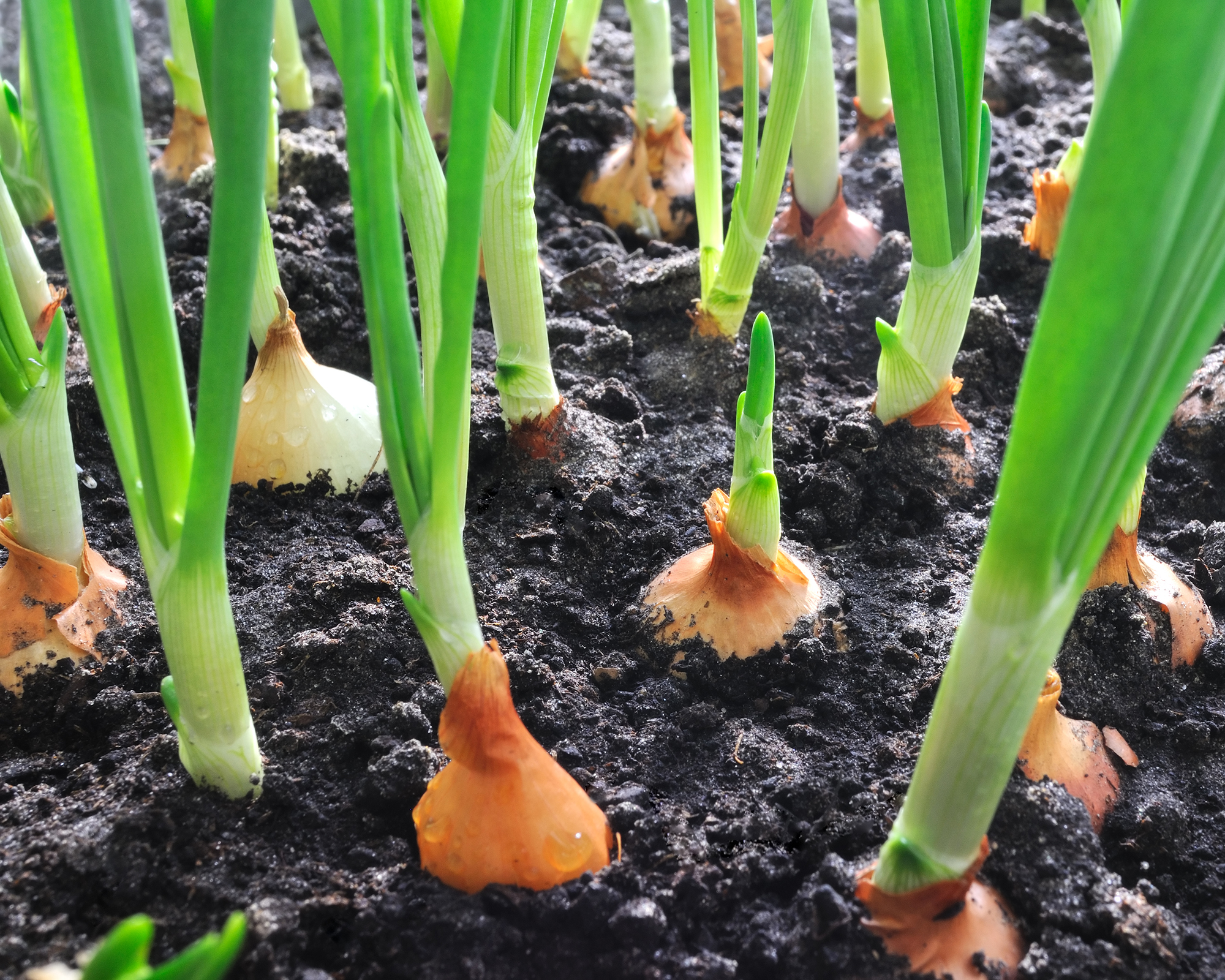
Onion Plant Care
Onions are an easy, rewarding crop, but they still benefit from a little regular care. They don’t need constant attention, but a few well-timed jobs will help them grow strong and healthy. Water during dry spells, feed to support steady growth, and keep on top of weeds and pests to give your onions the best chance of producing good-sized bulbs.
How Often to Water Onions
Watering onions well is necessary for growing a successful onion crop. They need a lot of water and should be constantly moist, but the soil should never get soggy. Ideal onion water needs are to irrigate to a depth of an inch (2.5 cm) once a week rather than a light sprinkling each day. When the tops begin to die back, cut back on the amount of watering to prevent the tops from rotting.
If you are watering onions with a hose or sprinkler, water in the morning rather than during the heat of the day, which will just end up evaporating.
Other than using a hose or sprinkler, onions can be watered by furrow irrigation or drip irrigation. With furrow irrigation, furrows are dug along the length of the onion row and flooded with water. This allows the plants to slowly soak up the water. Drip irrigation involves the use of a drip tape, which is a length of tube tape with punched holes that deliver water directly to the roots of the plants. This method for watering onions eliminates the issue of fungal disease that can result from overhead watering. This Treela Drip Tape from Amazon is a good option.
To tell if the plants have enough water, stick your finger in the ground next to the plants. If you can’t feel any moisture up to your first knuckle, it’s onion watering time.

Fertilizing Onions
Onions are heavy feeders, so they grow best in soil enriched with a few inches of compost before planting. During the early growing phase, they benefit from a regular nitrogen application, such as fish emulsion, blood meal, or a balanced fertilizer every two to three weeks. This builds strong leaf growth that then leads to larger bulbs. This Gardenwise slow-release 10-10-10 plant fertilizer, available from Amazon, is a good choice.
When the plants reach about 4–6 inches (10–15 cm) tall, side-dress with a nitrogen-heavy fertilizer along the rows and water it in, repeating as needed if your soil is poor. Once the bulbs begin to swell, stop adding nitrogen, because late feeding can cause soft bulbs that don’t store well. Keeping the soil evenly moist but not wet throughout the season also helps nutrients move efficiently and supports steady, healthy growth.
Mulching Onions
Mulching onions is helpful but optional, depending on your conditions. A light mulch can suppress weeds, conserve moisture, and keep soil temperatures more even. This is especially useful because onions have shallow roots and don’t compete well with weeds. It’s important that the layer of mulch be kept to a minimum 1-2 inches (2.5–5 cm) to prevent the mulch from hampering the bulbs’ development and trapping too much moisture, which can encourage rot. In cool, wet climates, skip mulch to keep the soil drier.
Harvesting Onions
Onions are a versatile, long-lasting crop that can be harvested in stages. Green tops can be clipped once they reach around 6 inches (15 cm) tall, and the plants will continue to grow, with flavor intensifying the longer you wait to harvest the bulbs. Any onions that have bolted should be used immediately, as they won’t store well.
Once tops begin to yellow and fall naturally, some gardeners gently fold down onion tops to encourage final ripening before harvest, especially for onions intended for storage.
For a full harvest, onions are ready when their tops naturally fall over and brown, usually 100–120 days after planting. Harvest onions early in the morning, when temperatures are cooler, carefully pulling or digging up the bulbs with the tops intact to avoid bruising, which can lead to rot. Shake off excess soil gently using a soft brush or gloved hand, and avoid washing the onions until you’re ready to cure or store them.

Onion Care Calendar
| Header Cell - Column 0 | Spring | Summer | Fall | Winter |
|---|---|---|---|---|
Plant sets | ✓ | Row 0 - Cell 2 | ✓ (warm zones and overwinter) | Row 0 - Cell 4 |
Start seeds indoors | Row 1 - Cell 1 | Row 1 - Cell 2 | Row 1 - Cell 3 | ✓ |
Transplant seedlings | ✓ | Row 2 - Cell 2 | Row 2 - Cell 3 | Row 2 - Cell 4 |
Fertilize | ✓ | ✓ | Row 3 - Cell 3 | Row 3 - Cell 4 |
Mulch | ✓ | ✓ | Row 4 - Cell 3 | Row 4 - Cell 4 |
Harvest tops | Row 5 - Cell 1 | ✓ | Row 5 - Cell 3 | Row 5 - Cell 4 |
Harvest bulbs | Row 6 - Cell 1 | ✓ | ✓ | Row 6 - Cell 4 |
Curing and Storing Onions
After harvesting onions, dry and cure them for 2–3 weeks in a clean, well-ventilated area until the tops and necks are fully dry and the skins are papery. Once cured, trim the tops to about 1 inch (2.5 cm) above the bulb and store onions in a basket, crate, or mesh bag in a dark, dry place at 32–40°F (0–4°C) with 65–70% humidity. These Ahyuan Hanging Mesh Storage Bags from Amazon allow for air circulation during storage.
Properly cured and stored onions can last up to three months, while damp conditions can lead to rot.
Propagating Onions
The most common method of propagating onions is from seed. It’s possible to save onion seeds from plants grown in a home garden, but they might not necessarily produce exact replicas of the original onion plant.
Bunching onions, or Welsh onions, can be propagated by division, or separating individual plants from the clumps and replanting them. Other onions, such as the Egyptian walking onion, form topsets or bulbils at the top of the plant. These can be removed from the plant and replanted to produce new plants.

Overwintering Onions
With the right varieties, planting time, and a little winter protection, overwintering onions can be successful in a wide range of regions and reward gardeners with earlier harvests in spring.
“Winter onions” is a general term used for certain cold-hardy varieties that can be planted in the fall and left to overwinter outdoors. This includes multiplier onions (also known as potato or ground onions), as well as some short-day and day-neutral varieties with greater cold tolerance. These onions resume growth early in spring, producing fresh green tops and, in many cases, earlier bulb harvests. They are commonly grown in USDA zones 4–9, though winter conditions vary widely even within this range.
As winter temperatures drop or fluctuate, some level of frost protection for onions becomes increasingly important, even for cold-hardy varieties. Onions tolerate light freezes, but prolonged cold or repeated freeze–thaw cycles can damage the foliage or even cause bulbs to rot. Mulching, ensuring good drainage, and using row covers during cold snaps can help fall-planted onions overwinter successfully across many climates.

Onion Problems
Home gardeners may run into a few onion-growing problems, though thankfully not all at the same time. Below are some of the more common issues to be aware of:
- Onion bolting happens when plants are stressed by cold snaps or sudden temperature changes, causing them to flower early and stop putting energy into bulb growth.
- Onions that don’t form bulbs are usually the result of choosing the wrong variety or improper growing conditions.
- Weeds can outcompete onions and their shallow roots for vital soil resources.
- Variegated or streaked onion leaves are usually the result of a genetic disorder known as chimera, which affects leaf coloring but does not make the onions inedible.
Onion Diseases
There are many potential onion diseases to look out, some common and others less so:
- Tip blight causes onion leaf tips to brown and die back, reducing plant vigor.
- Powdery mildew causes white, powdery growth on onion leaves and can weaken plants in warm, dry weather.
- Downy mildew thrives in cool, damp conditions and causes pale, fuzzy patches, eventually leading to leaf collapse.
- Allium rust causes yellow to orange spotting on onion foliage and can stunt bulb growth, particularly in wet weather.
- Leaf diseases such as Botrytis leaf blight, purple blotch, Stemphylium blight, and Xanthomonas bacterial blight can cause spotting, lesions, dieback, and reduced yields in cool, wet conditions.
- Root and bulb diseases, such as pink root, Pythium root rot, and Fusarium basal plate rot, can cause yellowing leaves, reduced bulb size, and crop losses, particularly in warm or poorly drained soils.
- Storage diseases, including neck rot, soft rot, mushy rot, and black mold, can develop if onions are poorly cured or damaged during harvest.
Onion Pests
While onions aren't among the most prone to vegetable garden pests, there are a few to keep an eye on:
- Onion thrips feed on leaves and cause silvery streaking and stunted bulbs, as well as tops curling up.
- Onion maggots tunnel into bulbs, leading to rot and collapse.
- Cutworms sever young seedlings at the soil line, especially when plants are just a few inches tall.
- Root knot nematodes damage onion roots, leading to poor growth and reduced bulb size.
But don’t let these issues deter you from growing onions! Many can be addressed with proper spacing, careful watering, mulching, and a keen eye on visiting insects.
Growing Onions in Containers
A small home garden is still plenty big enough for growing onions in containers. Green onions or small bulb onions are especially well-suited to containers, but larger storage types can thrive too if given enough space. Ensure you use a wide and deep container with drainage holes, preferably one that is at least 8–12 inches (20–30 cm) deep and 10–12 inches (25–30 cm) wide for each bulb or a cluster of smaller onions. This gives the roots and developing bulbs plenty of room to grow. You can even grow onions vertically in a large bottle with holes cut into the side.
Use a well-draining potting mix with some added compost or organic matter. Container-grown onions need consistent moisture and regular fertilization, since nutrients leach out of containers more quickly than in garden soil.

Growing Onions Indoors
Onions can be grown indoors, though they need the right conditions to thrive—particularly light. They will require bright light, ideally 6–8 hours of direct sunlight per day, or supplemental grow lights if natural light is limited.
Prepare a container as above and plant either seeds, sets, or transplants, knowing the seeds take the longest to reach harvest. Green onions or scallions are easiest indoors, while full-sized storage onions are possible if the container is large enough and lighting is optimal. Harvest stems intermittently and allow the bulbs to continue growing, or allow them to mature fully for bulbs.
Companion Planting Onions
Certain characteristics of onions make them great companion plants. Their strong scent repels common garden pests such as carrot flies, aphids, and cabbage worms. from neighboring vegetables. It’s also widely believed that onions improve the flavor and growth of neighboring plants such as carrots, tomatoes, and brassicas. And they attract beneficial insects, creating a healthier garden ecosystem.
A companion planting of carrots and onions, for instance, will deter the carrot root fly. In turn, the carrots will repel the onion fly from the onions. Aphids pestering strawberries will be turned away by onions’ strong scent, and cabbage loopers, cabbage worms, and flea beetles that love brassicas will be driven away by onions, as well.
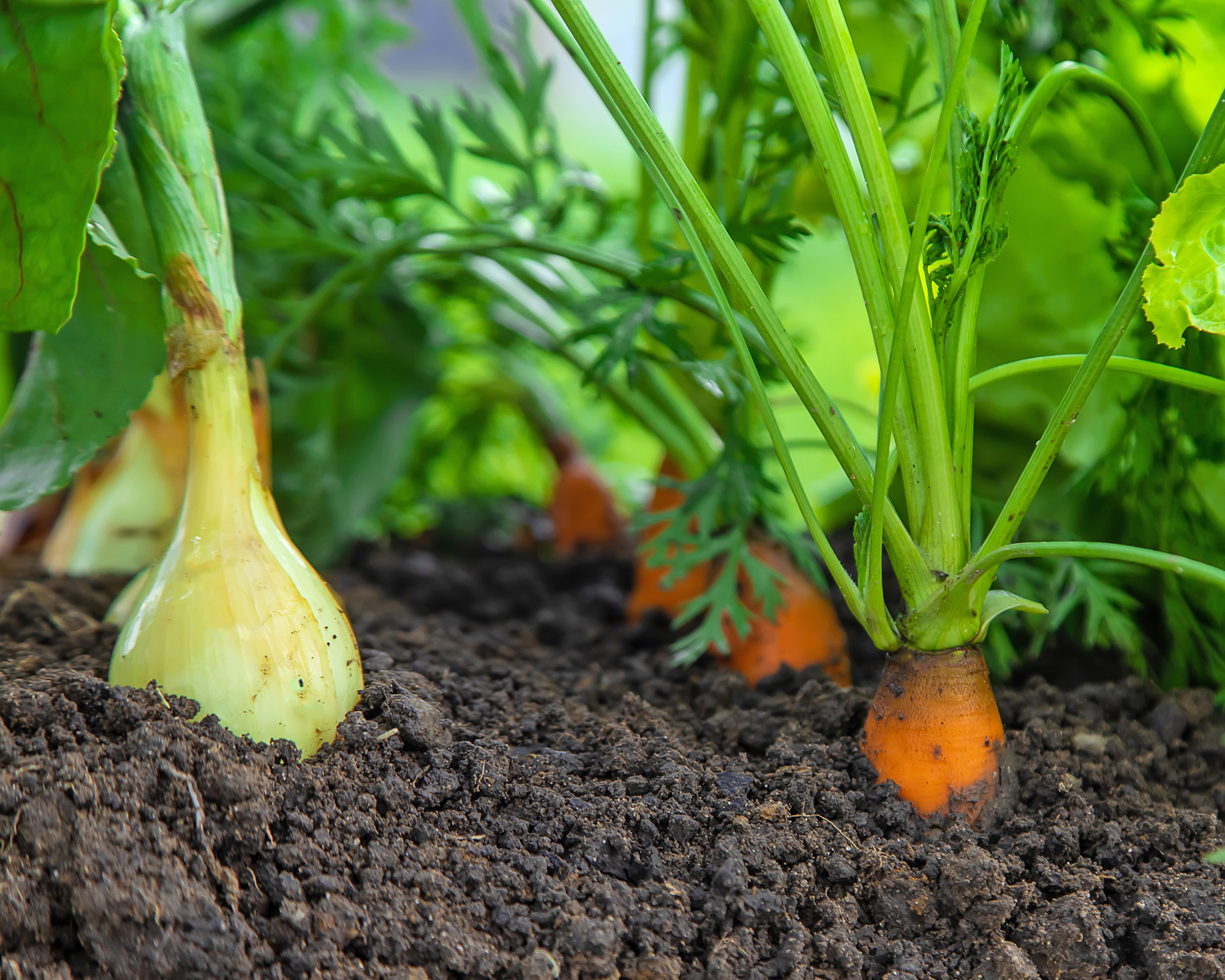
Frequently Asked Questions
Are onions good for you?
Yes! Onions are a healthy, low-calorie way to add flavor without relying on extra salt, sugar or fat. They are rich in antioxidants, like quercetin, along with fiber, Vitamin C, folic acid and sulfur compounds that may support heart health, help lower blood pressure, reduce inflammation, and lower the risk of certain diseases, including some cancers and cardiovascular conditions.
What's the key to growing large onion bulbs?
The size of an onion bulb mainly depends on how many leaves the plant develops before daylight starts shortening. The earlier you plant, the bigger your onions are likely to get. Plant as early as your soil can be worked, and enrich the bed with compost or fertilizer for best results.
Do onions need support to grow?
Onions do not need the support of stakes or cages during the growing season. Their naturally straight-growing stems will occasionally bend but that is without consequence.
Onion Growing Essentials
- Great seeds and sets are the beginning of a bountiful harvest. Find dozens of onion varieties at Burpee.
- Soil pH matters for strong onion growth. Make sure your garden’s soil meets the requirements with this 4-in-1 soil moisture meter from Amazon, which also checks pH, temperature, and light levels.
- Starting your onions from seeds? This Burpee 36-Cell Self-Watering Greenhouse Kit at Home Depot creates just the right environment.
- Watering overhead may lead to fungal issues. This Treela Drip Tape from Amazon with nozzles set at a 6-inch spacing, waters just the roots.
- Air circulation is critical when storing onions, and the Ahyuan Hanging Mesh Storage Bags offered by Amazon allows them to breathe easy.

Ellen Wells is a horticultural communications consultant with 30 years of experience writing about all aspects of the gardening world.
She has worked for many of horticulture’s biggest brand names, writing blog posts, articles, press releases, and design and instructional pieces. Her previous roles include Senior Editor and Editor-at-Large for Ball Publishing.
Ellen is based in New England where she gardens in Zone 7a. She loves tending to flower-filled containers on the patio and puttering around her vegetable garden.
- Heather RhoadesFounder of Gardening Know How
- Susan PattersonContributing Writer
- Amy GrantWriter